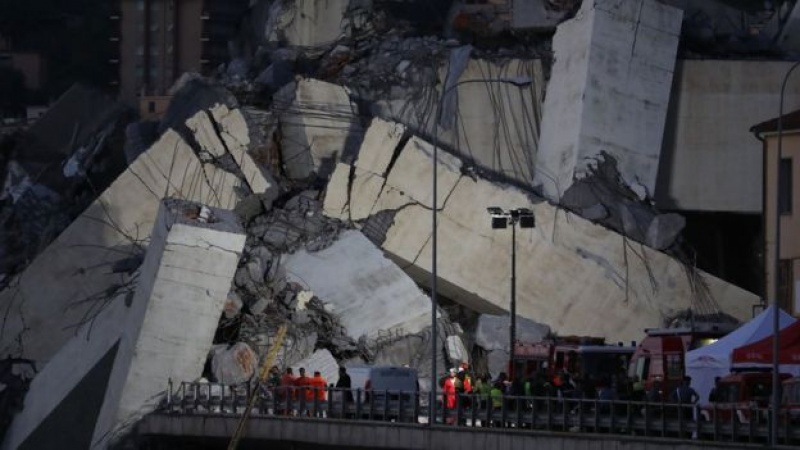
Rescuers in the north-western Italian city of Genoa continue to search for possible survivors after the dramatic collapse of a motorway bridge.
The interior minister said at least 37 people were killed when dozens of vehicles fell 45m (148ft).
About 16 people were injured in the collapse and the number missing ranges from four to 12.
About 250 firefighters from across Italy are taking part in the search, using sniffer dogs and climbing gear.
“We’re not giving up hope,” fire official Emanuele Giffi told AFP news agency, vowing teams would work “round the clock until the last victim is secured”.
More than 400 people have been evacuated amid fears other parts of the bridge might fall.
The cause of the disaster, which occurred during torrential rain, was not immediately clear but questions had been raised about the safety of the structure.
The Morandi Bridge, built in the 1960s, stands on the A10 toll motorway, an important conduit for goods traffic from local ports, which also serves the Italian Riviera and southern coast of France.
What are the challenges facing rescuers?
The BBC’s James Reynolds at the scene says firefighters have been working their way into small cracks in an effort to find anyone who might still be trapped in a vehicle.
Genoa police spokesperson Alessandra Bucci told Reuters it was thought that people were still alive.
Mr Salvini said three children, aged eight, 12 and 13 were among the dead.
The Italian fire service tweeted a video of one person being extracted and carefully lowered on cables from a shattered vehicle, which was suspended in the wreckage of the bridge, high above the ground.
Between 30 and 35 cars and three heavy vehicles were on the bridge at the time of the collapse.
A huge tower and sections of the bridge collapsed on to railway lines, a river and a warehouse.
The car of Davide Capello, 33, a former goalkeeper for Serie A side Cagliari, came down in the collapse but he survived.
“I was able to get out… I don’t know how my car wasn’t crushed. It seemed like a scene from a film, it was the apocalypse,” he said.
Marcello de Angelis, who is co-ordinating the Italian Red Cross rescue effort, told the BBC that rescuers were treating the disaster like an earthquake.
“There might be the possibility of some niches being created by the rubble itself, with people being protected by the rubble,” he said.
“The units that we have sent we use during earthquakes. So it is the same sort of situation – and also the risk of other collapses, obviously, is the same.”
How did the bridge collapse?
A section measuring about 200 metres fell at around 11:30 local time (09:30 GMT). Police say there was a violent cloudburst at the time.
An unnamed witness quoted by Italy’s Ansa news agency said: “We heard an incredible roar and first we thought it was thunder very close by.
“We live about 5km [three miles] from the bridge but we heard a crazy bang… We were very scared… Traffic went completely haywire and the city was paralysed.”
The collapse of the bridge was an “incident of vast proportions on a vital arterial road, not just for Genoa, but for the whole country”, said the governor of Liguria region, Giovanni Toti.
“The Morandi bridge connects three major ports in our country, used by tens, even hundreds of thousands of people. They depart from these ports on holiday. These docks receive most of our country’s imported goods. It damages the very structure of the Italian logistics system. We are expecting a very fast response from the government.”
Mr Borrelli said the authorities were trying to arrange help for those affected by the disaster, as well as setting up diversions for traffic.
Is Italian infrastructure underfunded?
This was the fifth bridge collapse in Italy in five years, according to Corriere Della Serra.
The new government has pledged to increase public investment.
The country spent more than €14bn (£12.5bn; $16bn) on its roads in 2006 but that had dropped to less than €4bn after the 2008 financial crisis, according to data from the Organisation for Economic Co-operation and Development.
The figures cover spending on new transport construction and the improvement of the existing networks.
Spending started to increase in 2013, when total spend was less than Spain, Germany, France and the UK.
Source : BBC

































